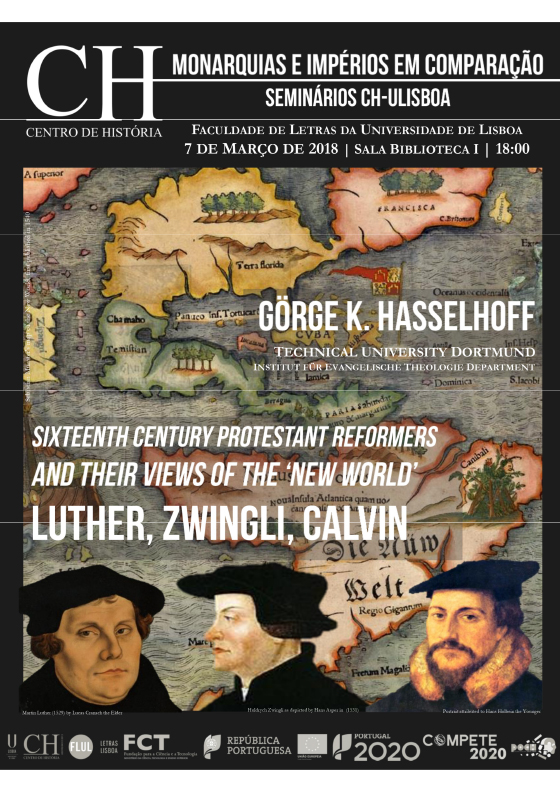Sixteenth Century Protestant Reformers and their Views of the ‘New World’: Luther, Zwingli, Calvin | Seminários Monarquias e Impérios em Comparação | Seminários CH-ULisboa
Faculdade de Letras da Universidade de Lisboa, Sala B1 (Biblioteca), 7 de Março de 2018, às 18:00
Organização | Centro de História da Universidade de Lisboa
Descarregar cartaz

In 1492 Columbus “discovered” the “New World”. The discovery brought several challenges with it. One of these challenges concerns the sphere of religiosity because it introduced a theological problem, namely the question about how to deal with non-Christian “pagans” in that or those continent(s). Whereas the school of Salamanca soon developed strategies in form of treatises, as it is the example of “On the Indians”, the Protestant reformers now deserve a special examination. Martin Luther (1483-1546), who triggered the Protestant reformation, does not seem to have had much interest in the New World and the salvation of its peoples. The situation was different with Huldrych Zwingli (1484-1531): although he does not seem to have had knowledge of Columbus’ discoveries, he could develop ideas on how to deal with non-Christian pagans due to his humanist background. The last ones could be applied to the “Indians” as well. John Calvin (1508-1564), on the other hand, put much emphasis on God’s revelation in Christ but, like Zwingli, he also emphasised God’s freedom with regard to the Holy Spirit.
Görge K. Hasselhoff
Technical University Dortmund
Institut für Evangelische Theologie Department
Görge K. Hasselhoff is graduate in Theology, Philosophy and Jewish Studies from Bielefeld, Marburg, Heidelberg and Berlin. He was research collaborator in Heidelberg and Bonn; he also received a PhD in Church History, Heidelberg: Dicit Rabbi Moyses - Studies on the image of Moses Maimonides in Latin Christian literature from the 13th to 15th centuries; he was as well research scholar at the KHK Bochum “Dynamics in the History of Religions”; he received an Habilitation at the Technical University Dortmund and, currently, is adjunct professor; he held several visiting professorships in Potsdam (Germany), Porto Alegre, RS (Brazil), São Leopoldo, RS (Brazil), Barcelona (Catalonia); finally he is author of four monographs and editor of fifteen volumes, many articles and reviews.

